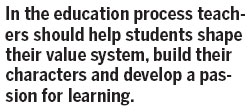More than just imparting knowledge
Updated: 2013-06-15 07:45
By Fung Keung(China Daily)
|
|||||||

I teach journalism classes in a local university. I started teaching in 2008 and six months ago (for the first time) I was thinking of quitting to launch my own English-tutorial school. To enjoy life as an entrepreneur was a major motivation, which I called the pull factor. The push factor was that I was "lost" as to what my role as a teacher should be.
Most people know that there is a two-track system in university education in Hong Kong. Those with PhD degrees teach two courses each semester and spend time writing publishable academic papers. Those with years of industry experience but no PhD qualifications don't need to produce academic papers but they are required to teach three courses per semester. Fair enough.
Academics with PhDs, as long as they keep on writing publishable academic articles (about two per year as a rule of thumb), find their jobs are safe no matter how poor their teaching quality. However, the so-called teaching staff (I am one of them) must receive good feedback from students. If the grades they get from students are low for two years consecutively their teaching careers will be at stake.

The grades my students gave me were consistently higher than the average of all teachers until the current year. My students wrote (anonymously) on teaching evaluation forms that "Victor is a dictator", "Victor doesn't move with the times", and "Victor is as stubborn as a dinosaur".
I got these remarks because I set a very straight policy in class. If any student was caught playing with his/her smartphone during lectures, his/her phone would be confiscated and donated to the Single Parents Association in Hong Kong. I walk the walk and talk the talk. I never bring my cell phone to class. Many students were upset with this draconian policy and called me names.
I then consulted my colleagues in the same faculty. I have been disappointed with what I've heard so far. To sum up, they said: "just let the students play with their phones. It is their problem, not yours;" "they pay tuition. If they don't get value for money and learn nothing, it is their problem, not yours," and "why are you so pig-headed? Just focus on the few who are eager to learn."
Am I behind the times, as some students suggest? Am I a dinosaur? I am not sure. I am deeply confused. I always believe that education should be more than just imparting technical knowledge. Moral and ethical values should also be taught. Students should know they ought to respect their teachers and classmates. When students play with smartphones, they often burst into laughter or giggles, which are disruptive and annoying to others in the classroom, to say the least. I told my students if they didn't want to participate in class activities and observe class rules, they should stay at home.
In the education process teachers should help students shape their value system, build their characters and develop a passion for learning. Every time I read on newspaper employers' surveys on graduates' performance, my heart sank. Invariably they would say that university graduates nowadays don't know much about anything, their working attitude is poor and their language standards (both English and Chinese) are below expectations. I feel ashamed. I haven't done my job well.
I know I am in the minority group as far as my no-nonsense teaching approach is concerned, but I am proud of what I have done. (Perhaps it is time I polished and updated my curriculum vitae just in case.)
An old Chinese saying often reverberates in my mind: "It's the parents' fault to rear but not teach their children well. And it's the teacher's sloth to teach but not be strict."
The author is coordinator of the B.S.Sc in financial journalism program at Hong Kong Baptist University.
(China Daily 06/15/2013 page4)